
Journal of Asthma and Allergy
Scope & Guideline
Exploring innovative solutions for respiratory challenges.
Introduction
Aims and Scopes
- Asthma Pathophysiology and Mechanisms:
Research focusing on the biological mechanisms underlying asthma, including immune responses, inflammation, and genetic factors. - Clinical Management and Guidelines:
Studies evaluating the effectiveness of various treatment strategies, adherence to clinical guidelines, and the impact of management protocols on patient outcomes. - Epidemiology and Public Health:
Investigations into the prevalence, risk factors, and public health implications of asthma and allergies, examining demographic and environmental influences. - Novel Therapeutics and Biologics:
Exploration of new treatment modalities, including biologic therapies, their mechanisms of action, and real-world effectiveness in managing severe asthma and allergies. - Comorbidities and Quality of Life:
Research assessing the impact of comorbid conditions, such as obesity and mental health disorders, on asthma management and patient quality of life. - Patient Perspectives and Education:
Studies focusing on patient-reported outcomes, education strategies, and the role of healthcare providers in managing asthma and allergies.
Trending and Emerging
- Integration of Digital Health and Technology:
The rise of digital health tools, including mobile applications for asthma management and telemedicine, reflects an increasing trend in utilizing technology to enhance patient care and monitoring. - Environmental and Lifestyle Factors:
Research exploring the impact of environmental triggers, such as air pollution and climate change, on asthma exacerbations is becoming increasingly relevant, highlighting the need for preventive strategies. - Personalized Medicine and Biomarker Research:
Emerging studies focus on tailored treatment approaches based on individual patient profiles, including genetic and biomarker assessments, to optimize therapeutic outcomes. - Interdisciplinary Approaches to Asthma Management:
Research emphasizing collaboration among various healthcare disciplines, including psychology, nutrition, and pharmacology, is gaining prominence, reflecting a more comprehensive approach to patient care. - Impact of COVID-19 on Asthma Management:
The pandemic has prompted an increase in research examining the effects of COVID-19 on asthma patients, including complications, management strategies, and healthcare access.
Declining or Waning
- Traditional Pharmacotherapy:
Research on conventional asthma treatments, such as inhaled corticosteroids and short-acting beta-agonists, appears to be waning in favor of studies focusing on innovative biologics and personalized medicine. - Single-Disease Focus:
There is a noticeable decline in studies that examine asthma in isolation, with more research now integrating the study of allergies and other comorbidities, indicating a shift towards a more holistic understanding of patient health. - Basic Science without Clinical Translation:
While fundamental research remains essential, there seems to be a decreasing trend in basic science studies that do not directly inform clinical practice or patient outcomes, as the journal emphasizes translational research. - Epidemiological Studies Focused on Older Cohorts:
Research concentrating solely on older populations is diminishing, as the journal increasingly features studies on pediatric and diverse populations, reflecting a broader public health perspective.
Similar Journals
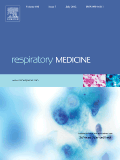
RESPIRATORY MEDICINE
Innovating Solutions for Respiratory ChallengesRespiratory Medicine is a leading journal in the field of pulmonary and respiratory medicine, dedicated to advancing knowledge and research from 1989 to 2024. Published by W B Saunders Co Ltd, this esteemed journal is recognized for its high impact, reflected in its Q1 quartile ranking in 2023 within the category of Pulmonary and Respiratory Medicine and its impressive Scopus ranking of 27 out of 155 journals, placing it in the 82nd percentile. With a focus on publishing groundbreaking research, comprehensive reviews, and innovative practices, Respiratory Medicine serves as an essential resource for health professionals, researchers, and students aiming to improve patient outcomes and understand complex respiratory conditions. While the journal is not Open Access, its contributions to the scientific community are invaluable, providing insights that drive both academic and clinical advancements in respiratory health.
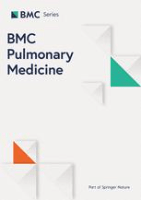
BMC Pulmonary Medicine
Championing unrestricted access to vital pulmonary research.BMC Pulmonary Medicine is a leading open access journal dedicated to the field of pulmonary and respiratory medicine, published by BMC since its inception in 2001. With an ISSN of 1471-2466, this journal plays a pivotal role in advancing knowledge and research dissemination in its field, maintaining a prominent position with a 2023 Scopus ranking of #65 out of 155 journals, placing it within the 58th percentile of the category. Based in the United Kingdom, it operates under a collaborative mission to provide unrestricted access to vital research, contributing to the global understanding of respiratory health issues. The journal is recognized for its commitment to high-quality, peer-reviewed research, as evidenced by its Q2 category designation in Pulmonary and Respiratory Medicine. BMC Pulmonary Medicine aims to foster innovation and scholarship among researchers, professionals, and students, making it an indispensable resource for anyone engaged in pulmonary research and practice. The journal, accessible to everyone, enables the dissemination of impactful research that can influence clinical practice and policy worldwide.

RESPIROLOGY
Pioneering Research for a Breath of Fresh AirRESPIROLOGY is a prestigious academic journal that focuses on the field of Pulmonary and Respiratory Medicine, publishing high-quality research and comprehensive reviews that contribute significantly to the understanding and management of respiratory health. As a distinguished publication of WILEY, it has established a strong presence in the academic world with an impressive impact factor and ranked in the Q1 category, recognized for its influence and innovation in the field. RESPIROLOGY is committed to disseminating cutting-edge research from 1996 through 2024, appearing regularly in SCOPUS with a rank of #14 out of 155, placing it in the rarefied 91st percentile among its peers. The journal invites contributions from researchers, professionals, and students, fostering a collaborative space for advancing knowledge in pulmonary medicine. Although it does not offer open access, its readership spans globally, indicating the high regard in which it is held within the scientific community.
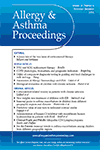
ALLERGY AND ASTHMA PROCEEDINGS
Uncovering insights in Immunology and Pulmonary Medicine.ALLERGY AND ASTHMA PROCEEDINGS, published by Ocean Side Publications Inc, is a vital resource in the fields of Immunology, Allergy, and Pulmonary Medicine. With an impressive trajectory of publication from 1996 to 2024, this journal serves as a platform for cutting-edge research and advancements in the understanding of allergic and asthmatic conditions. Positioned in the Q3 quartile for Immunology and Allergy and Q2 for both Medicine (miscellaneous) and Pulmonary Medicine, the journal exhibits a robust impact within the academic community, boasting Scopus rankings that reflect its significance. The journal offers open access options, allowing for the dissemination of critical findings to a wider audience. Aimed at researchers, healthcare professionals, and students alike, ALLERGY AND ASTHMA PROCEEDINGS addresses the complexities of respiratory diseases and facilitates the sharing of knowledge that is essential to improving patient care and outcomes.

CURRENT ALLERGY AND ASTHMA REPORTS
Exploring Innovations in Allergy and Pulmonary MedicineCURRENT ALLERGY AND ASTHMA REPORTS, published by CURRENT MEDICINE GROUP, is a premier journal dedicated to advancing knowledge in the fields of allergy, asthma, and pulmonary medicine. With an impressive impact factor and a distinguished position in the Scopus ranking system—holding the 12th spot in Pulmonary and Respiratory Medicine and 40th in Immunology and Allergy—this journal is vital for researchers, clinicians, and healthcare professionals aiming to stay abreast of the latest developments and evidence-based practices. Since its inception in 2001, the journal has committed to publishing rigorous research articles, reviews, and expert opinion pieces that inform both clinical practice and research initiatives. Although it does not currently offer open access, it continues to maintain a robust platform for disseminating critical findings and fostering scholarly dialogue, ensuring it remains an essential resource for those dedicated to improving patient outcomes in respiratory health.

Tuberculosis and Respiratory Diseases
Advancing knowledge in respiratory health.Tuberculosis and Respiratory Diseases is a leading open-access journal published by THE KOREAN ACADEMY OF TUBERCULOSIS & RESPIRATORY DISEASES, dedicated to disseminating knowledge in the fields of infectious diseases and pulmonary medicine. Since its inception in 1980, the journal has undergone significant growth, currently recognized in the elite Q2 category for both Infectious Diseases and Pulmonary and Respiratory Medicine as of 2023. With an impact factor reflecting its esteemed position—ranked 52nd in its category—it serves as a vital resource for researchers and healthcare professionals seeking cutting-edge insights, studies, and advancements in the management and treatment of respiratory diseases, particularly tuberculosis. The journal is committed to providing open access to its content since 2013, ensuring that critical research is available to scholars worldwide, fostering collaboration and innovation in the global fight against respiratory illnesses.

Gastrointestinal Disorders
Exploring the Frontiers of GI Disorders and TreatmentsGastrointestinal Disorders is a prominent open-access journal published by MDPI, based in Switzerland, that focuses on the latest research and innovations in the fields of gastroenterology, hepatology, and immunology. Since its inception in 2019, the journal has provided a vital platform for researchers and professionals to disseminate their findings, engaging with a global audience keen on advancing knowledge in gastrointestinal health. With a dedicated commitment to high-quality, peer-reviewed articles, Gastrointestinal Disorders has gained recognition in 2023, achieving Q3 status in gastroenterology and notable rankings in several other categories, including a respectable position in the quartiles for hepatology, immunology, and oncology. Despite its recent establishment, the journal has quickly become a valuable resource, facilitating open access to critical insights in the study of gastrointestinal diseases and their management, ensuring that emerging research is readily available to inform clinical practice and educate future professionals.
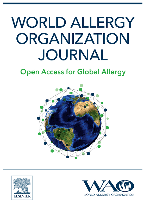
World Allergy Organization Journal
Elevating Standards in Allergy Research and TreatmentWorld Allergy Organization Journal is a premier open-access publication dedicated to advancing the understanding and treatment of allergic diseases and related conditions. Published by ELSEVIER, this journal boasts a commendable impact factor and ranks in the second quartile for both Immunology and Allergy, as well as the first quartile in Pulmonary and Respiratory Medicine. Since its inception as an open-access journal in 2008, it has consistently aimed to provide a credible platform for researchers, clinicians, and students to disseminate original research, reviews, and clinical studies. With its emphasis on high-quality scholarship and practical applications, the World Allergy Organization Journal plays a crucial role in bridging theoretical knowledge with clinical practice, making significant contributions to the fields of immunology, allergy, and respiratory medicine. The journal is particularly notable for its accessibility to a global audience, exemplified by its open-access model since 2008, promoting a wider exchange of ideas and innovations across borders.

Current Allergy & Clinical Immunology
Unlocking insights for a healthier tomorrow.Current Allergy & Clinical Immunology is a vital peer-reviewed journal published by the Allergy Society of South Africa, focused on advancing the field of immunology and allergy medicine. With an ISSN of 1609-3607, this journal offers crucial insights and research findings pertinent to the understanding and treatment of allergic conditions. Operating from South Africa, it features contributions from a diverse range of authors and professionals in the field. Published from 2008 to 2024, the journal plays an essential role in disseminating current knowledge, even as it holds a Q4 ranking in Immunology and Allergy and is positioned at the 4th percentile based on Scopus rankings. While not open access, it remains an important resource for researchers, practitioners, and students looking to stay informed on emerging trends and breakthroughs in allergy and clinical immunology.
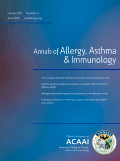
ANNALS OF ALLERGY ASTHMA & IMMUNOLOGY
Charting New Territories in Respiratory Health ResearchANNALS OF ALLERGY ASTHMA & IMMUNOLOGY is a premier peer-reviewed journal published by Elsevier Science Inc, dedicated to advancing the fields of allergy, asthma, and immunology. With its roots dating back to 1995 and with a focus on high-impact research, this journal has established itself as a leading platform for the dissemination of original research, reviews, and clinical studies within these critical areas. The journal boasts an impressive impact factor, supporting its Q2 ranking in both Immunology and Allergy, as well as in Pulmonary and Respiratory Medicine, indicating its significant contribution to the scientific community. Although it does not currently offer open access options, its comprehensive coverage and rigorous peer-review process ensure that published articles are of the highest quality, making it an invaluable resource for researchers, clinicians, and students alike. The Scopus rankings reflect its esteemed position in the academic landscape, providing professionals with access to cutting-edge developments and insights into the management and treatment of allergic and respiratory conditions.